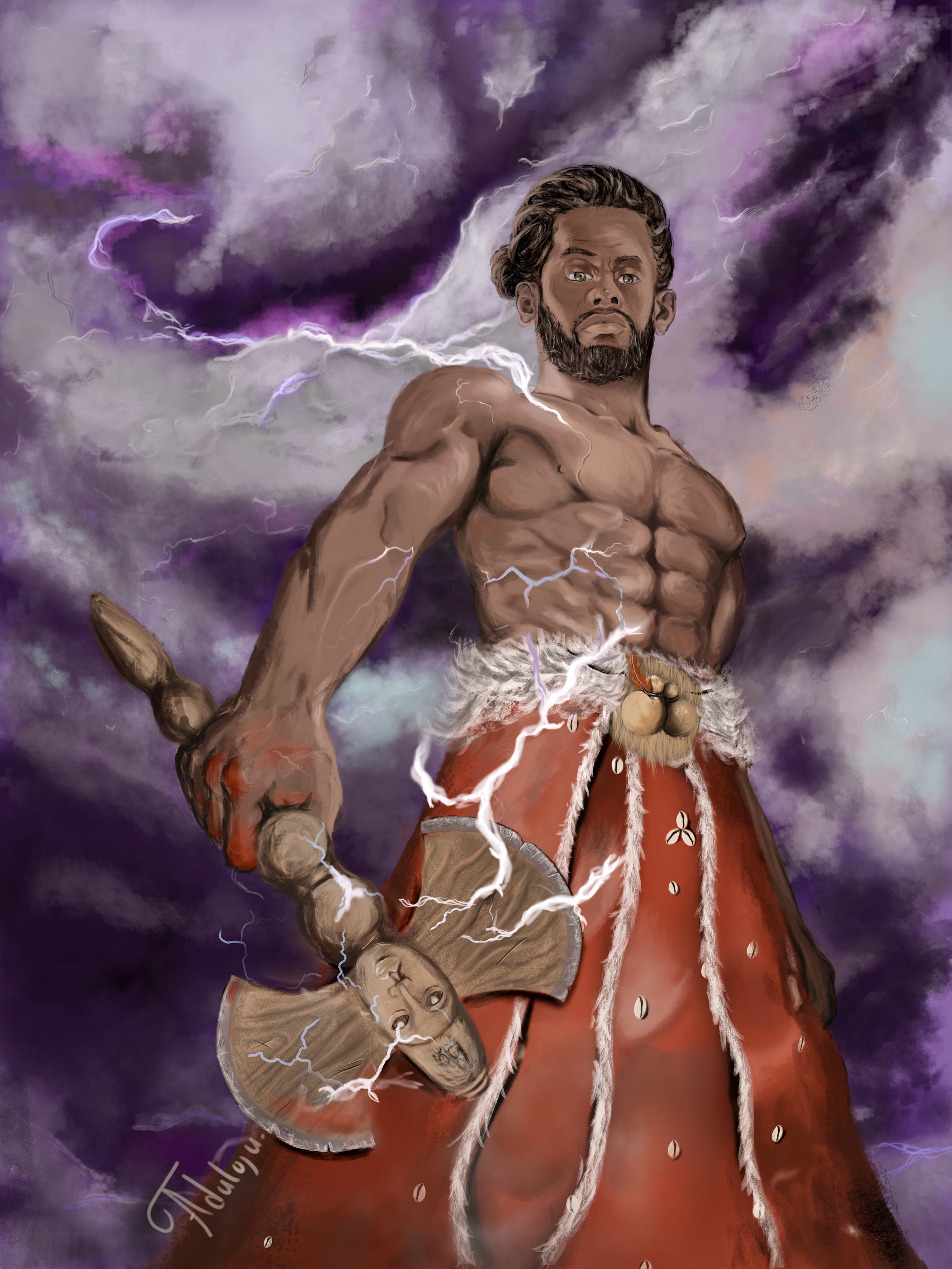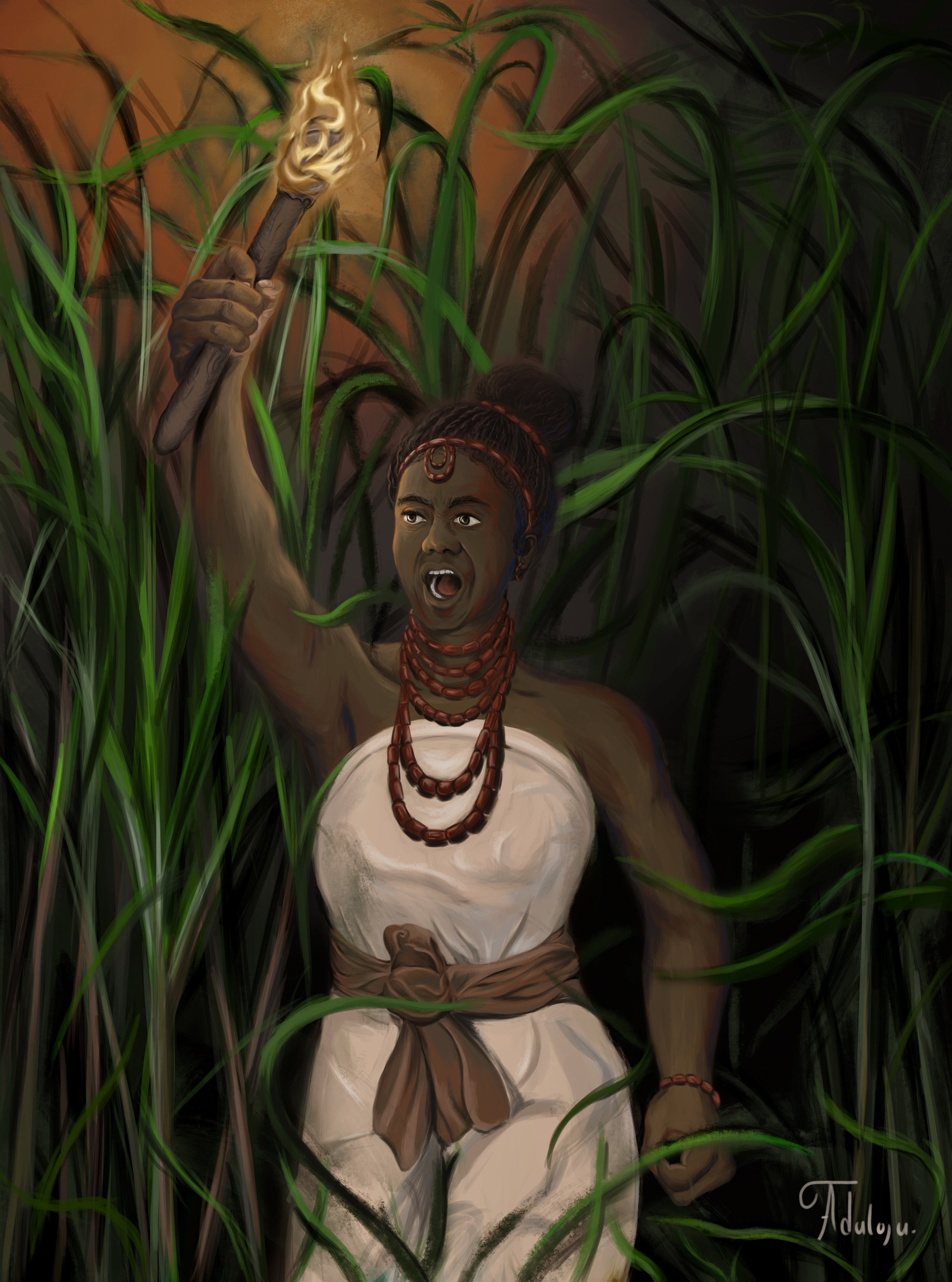EMPOWERING BLACK ART
Learn About The Rich History And Culture Of Black People.
Shango
In the ancient Oyo kingdom, the fourth Alaafin (king) of Oyo, Shango, renowned for his prowess in war, transformed into a deity after his death, becoming the orisha of thunder and lightning.
The people, honouring him with rituals and dances, saw the skies rumble and light up with lightning as a symbol of Shango's divine power. The colour red, associated with him, represented his might.
Shango's tales, from his earthly rule to his celestial presence, became woven into the cultural fabric of Oyo, celebrated through vibrant festivals.
His legacy, a blend of history and mythology, resonated through generations, symbolising the resilience of the kingdom and the enduring echoes of Sango's divine influence.
Obatala
In the beginning, when only sky and water existed, Olodumare sent Obatala, the wise and pure Orisha, to create the earth. Carrying a golden chain, a snail shell of sand, and a white hen, Obatala descended from the heavens.
But along the way, he drank from his gourd of palm wine and fell asleep. While he rested, Oduduwa completed the task spreading the sand with the hen to form the first land, Ife.
When Obatala awoke, he felt shame and vowed never to drink again. To make amends, he shaped humans from clay, and Olodumare breathed life into them. Those who were born differently became especially beloved to him.
Clothed in white, Obatala remains the Orisha of creation, purity, and compassion.
Moremi Ajasoro
Queen Moremi Ajasoro, renowned for her beauty and bravery, was the wife of Oranmiyan, son of Oduduwa, the first king of Ile Ife in southwestern Nigeria. Ile Ife was at war with the Ugbo tribe, who, perceived as spirits, enslaved Ife's people.
Moremi, determined to end the conflict, made a pact with the river spirit Esimirin, sacrificing herself to the Ugbo. As their queen, she learned the Ugbo's military secrets, escaped, and shared vital information with Ife, leading to their victory.
However, Moremi's triumph came at a cost. To fulfill her oath to Esimirin, she sacrificed her only son, Olurogbo, grieving the entire kingdom. In consolation, the Yoruba people pledged to be Moremi's eternal children.
The Edi Festival in Nigeria commemorates Moremi's sacrifice, symbolizing the resilience of a united people.
Queen Idia
Queen Idia was a powerful and influential queen in the Benin Empire, which existed in what is now modern-day Nigeria. She was the mother of Esigie, who became the Oba (king) of the Benin Empire in the early 16th century.
Queen Idia is remembered for her significant role in the political and military affairs of the Benin Kingdom. She is particularly known for her involvement in the expansion and consolidation of the empire. Queen Idia was not only a queen and a mother but also a strategic thinker and advisor to her son, Oba Esigie.
One of the most iconic representations of Queen Idia is found in the form of the "Ivory Mask of Benin" or the "Queen Idia Mask." This mask is a masterpiece of African art and is believed to have been created to honour Queen Idia for her contributions to the Benin Empire.
The mask, adorned with coral beads and intricate details, symbolises her strength, wisdom, and protective role. Idia's legacy goes beyond her lifetime, and she is celebrated as a symbol of female empowerment, political acumen, and cultural pride in the history of the Benin Kingdom.
Eyo
The Adamu Orisha Play, also known as 'Eyo,' is an entrancing traditional dance festival that takes place in Lagos, Nigeria. With its origins dating back to February 20th, 1854, the Eyo festival was initially established to honour the late Oba Akintoye, a prominent figure who held the title of Oba of Lagos during the mid-1800s.
This vibrant celebration has become one of the most significant Yoruba festivals in Lagos, observed whenever a new monarch ascends the throne or as a funeral to pay tribute to the departed Oba. Additionally, the festival can be organized to commemorate the passing of a distinguished chief in Lagos.
The Adamu festival, a remarkable event exclusive to Lagos state, showcases the mesmerising Eyos, adorned in elegant white cloth known as 'agbada' and distinctive hats called 'akete.' This painting draws inspiration from the enchanting yo festivals, serving as a vibrant tribute to Yoruba culture by depicting the dancing masquerades that embody the spirits of the ancestors.
Each Eyo possesses its own unique identity, distinguishable by the akete (hat) adorned with colours representing the Iga (palace) of the ruling family.
Immerse yourself in the rich tapestry of Yoruba traditions and experience the captivating allure of the Adamu Orisha Play, a festival that beautifully encapsulates the essence of Lagos' cultural heritage.





